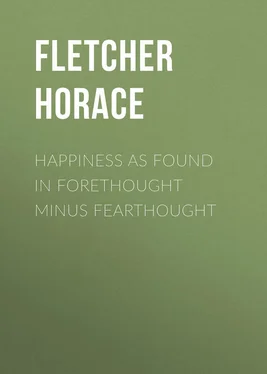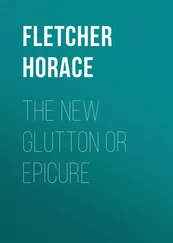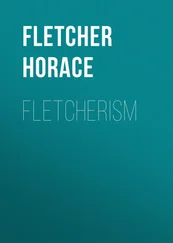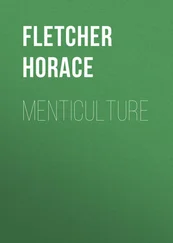Horace Fletcher - Happiness as Found in Forethought Minus Fearthought
Здесь есть возможность читать онлайн «Horace Fletcher - Happiness as Found in Forethought Minus Fearthought» — ознакомительный отрывок электронной книги совершенно бесплатно, а после прочтения отрывка купить полную версию. В некоторых случаях можно слушать аудио, скачать через торрент в формате fb2 и присутствует краткое содержание. Жанр: foreign_antique, foreign_prose, на английском языке. Описание произведения, (предисловие) а так же отзывы посетителей доступны на портале библиотеки ЛибКат.
- Название:Happiness as Found in Forethought Minus Fearthought
- Автор:
- Жанр:
- Год:неизвестен
- ISBN:нет данных
- Рейтинг книги:3 / 5. Голосов: 1
-
Избранное:Добавить в избранное
- Отзывы:
-
Ваша оценка:
- 60
- 1
- 2
- 3
- 4
- 5
Happiness as Found in Forethought Minus Fearthought: краткое содержание, описание и аннотация
Предлагаем к чтению аннотацию, описание, краткое содержание или предисловие (зависит от того, что написал сам автор книги «Happiness as Found in Forethought Minus Fearthought»). Если вы не нашли необходимую информацию о книге — напишите в комментариях, мы постараемся отыскать её.
Happiness as Found in Forethought Minus Fearthought — читать онлайн ознакомительный отрывок
Ниже представлен текст книги, разбитый по страницам. Система сохранения места последней прочитанной страницы, позволяет с удобством читать онлайн бесплатно книгу «Happiness as Found in Forethought Minus Fearthought», без необходимости каждый раз заново искать на чём Вы остановились. Поставьте закладку, и сможете в любой момент перейти на страницу, на которой закончили чтение.
Интервал:
Закладка:
Horace Fletcher
Happiness as Found in Forethought Minus Fearthought
"Happiness" was written in answer to many questions elicited by the publication of "Menticulture."
The "Introduction" is not material to the subject except to show the sources of the suggestions relative to profitable living contained in the two books.
The vital truths underlying the philosophy of life can be intelligently stated in a few hundred words, both as regards the proper cultivation of the body, or physical equipment, and as regards the cultivation of the mind, so that they may do the best work of which they are capable. False example and false teaching, however, have so impressed habits of weakness on the body and the mind that the chief aim of curative suggestion should be to disabuse. That is, to cause people to discard bad habits of thinking and doing in order that normal, healthy tendencies of action and of thought may take their place.
The difficulty of the task undertaken by any student and advocate of reform is not the intelligent statement of the simple truth, but the discovery and refutation of a complication of errors which have assumed the reality of truth. Simile and illustration, some logic and much ridicule, are among the weapons that have been effective in combating old habits of wrong thinking, but it is impossible to say which argument will fit a particular case.
Each of the illustrations used in this book has been the means of curing some one person of some phase of fearthought, and together they have released many from that dread enemy of health and happiness called "Fear."
The normal condition of Nature is healthy growth – evolution or progression – and Man's chief function in assisting her is first the removal of weeds, or other deterrents to the natural process, and afterwards the maintaining of quarantine against their return.
True Happiness is the Evidence and Fruit of Conscious Usefulness.
The wider the opportunity for usefulness the greater and keener the happiness resulting therefrom. Consciousness of being one's best and doing one's best, however, regardless of scope, is the only way to unalloyed happiness, and to the accomplishment of the highest ideals. There can be no more miserable, sorry and harrowing condition than that called "Indifference."
The separating of fearthought from forethought is not alone valuable because of the personal comfort of being fearless, but it is especially useful in that the energy made possible by the divorce is available in assisting others to be strong and helpful to themselves and to each other.
If attention is once directed to the pulling of weeds, to the removal of deterrents, to the eradication of the germs of disorder, the pursuit will become most fascinating, owing to the quick and happy response of Nature in her willingness to "Do the rest."
One of the marvels revealed by study of the question of the possibility of a Perfect Social Quarantine, having for its aim a protection that will not permit any child to escape care , is the comparatively small areas of the propagating centers in which are bred the germs of social disorder.
This subject is treated in a book, now in press, called "That Last Waif; or, Social Quarantine."
The same insignificance of origin applies to individual, moral and physical deterrents to happiness which afflict otherwise healthy men and women. The tap-roots of all unhappiness are not formidable in the light of present knowledge.
Whoever is less than keenly happy is the victim of errors or illusions whose germs are easy to kill when found. It is the especial object of this book to help those who are suffering unhappiness to find the tap-roots of their troubles.
Auditorium Annex,
Chicago, September 5th, 1898.
INTRODUCTION
How to be happy is the one desire common to all humanity.
How to be happier is a better statement, for there is no one so miserable but has some degree of happiness at times – enjoys some moments when he forgets to be unhappy, and looks with appreciation, even if with only dull and bleared appreciation, upon the things that are always beautiful and joyful and free.
In highly civilized life there is everything to encourage, and there should be nothing to prevent, happiness.
The normal condition of man in civilized life is that of happiness.
So great, and so greatly increasing, has been the acceleration of progress, that the possibility of unrestrained and unfettered happiness has come to us in advance of our being prepared to accept the freedom of it, owing, mainly, no doubt, to the weight of traditions under the habit of which we are prone to struggle long after the conditions that gave birth to the traditions have ceased to exist.
The experience of the world has revealed, and is constantly revealing, simple expedients applicable to every possible combination of evils – except the evil of perverse ignorance – the use of which will insure the success of honest and reasonable aims, no matter how unfavorable the equipment and environment have been or are at the present time.
In a singularly adventurous career I have passed through many of the conditions in which discomfort, fear and unhappiness breed, including the direst straits to which life can be exposed, and have also been possessed, at different times, of the means to comfort and happiness that broad opportunity, keen appreciation and affluence are supposed to furnish.
I have shared the occupations and sympathies of persons of many different nationalities and of every degree of opportunity and intelligence; in torrid, temperate and frigid climes; in the Americas, in Africa, in Europe, in Asia, and in the far-off islands of distant seas; on shipboard and on the farm; in the mine and in the factory; in the camp and on the commons; in the arts of war and in the pursuits of peace; in the country cross-roads school-house and in the university; in service and in command – in all of which change it was possible only to serve apprenticeships, however, for in such variety of occupation no great accomplishment could develop, except the accomplishment of variety itself; but, at the same time, it was not possible for any of the occupations to become stale to criticism, and the ability to analyze, in the light of comparison, is the natural result and the impelling motive in these essays.
I have pushed ways through tangled chaparral, led by hopes of discovering precious metals; and have chopped out roads in the jungle, allured by the excitement of the chase and the spirit of adventure. I have observed nature in the vastness of her wild domains; in the calm and in the terror of the mighty deep; in the harmonious quiet of rural cultivation, and in the supreme picturesqueness of rugged mountain landscapes, studded about, here and there, with golden-roofed temples and cloistered parks. I have not only seen nature with appreciative eye when she has displayed her million moods and when she has taken on myriad aspects, but I have tried to interpret her in terms of line and color in famous studios in Europe, under the advice of world-honored masters of the art.
The numerous occupations engaged in were, in many cases, used as necessary means to desired ends. While I have enjoyed making le grand tour as a "globe trotter," I have also had to "work my way" at times, and in "working my way" have had to undertake occupations leading that "way." So successful have I been in finding means or excuses for travel, that among my intimates the saying is current that if I "took it into my head" to want to go to either of the poles, I would engage in a business that would make it necessary for me to go there, thus conserving my respect for duty and my desire for travel at the same time.
Читать дальшеИнтервал:
Закладка:
Похожие книги на «Happiness as Found in Forethought Minus Fearthought»
Представляем Вашему вниманию похожие книги на «Happiness as Found in Forethought Minus Fearthought» списком для выбора. Мы отобрали схожую по названию и смыслу литературу в надежде предоставить читателям больше вариантов отыскать новые, интересные, ещё непрочитанные произведения.
Обсуждение, отзывы о книге «Happiness as Found in Forethought Minus Fearthought» и просто собственные мнения читателей. Оставьте ваши комментарии, напишите, что Вы думаете о произведении, его смысле или главных героях. Укажите что конкретно понравилось, а что нет, и почему Вы так считаете.












